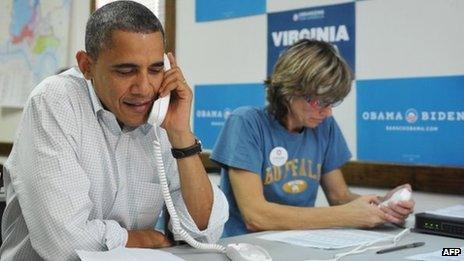Obama's do-or-die debate
- Published
- comments

President Obama will be hoping to connect with voters in the next debate
The clash between Mitt Romney and Barack Obama in a town hall-style meeting in Long Island could decide the outcome of the election.
Even as I write this, it sounds over-dramatic, putting far too much weight on one event.
But consider this: Mr Obama's failure and Mr Romney's success in the last debate coincided with a switch in the opinion polls. They didn't just narrow. Many showed, for the first time in the campaign, Mr Romney in the lead, external.
It was as true for the vital swing states as it was for the less meaningful national polls. Of course, this New York debate may change nothing, but no-one now doubts debates can matter. Another misjudged performance by Mr Obama could indeed come close to sealing his fate.
Neither hot nor cold
Team Obama have locked him away for four days in preparation. Few doubt his mastery of the facts, so this doesn't mean prepping him on Afghan geography or drilling into the detail of marginal tax rates.
It will be about style and image. Presumably they will be asking him and each other that most puzzling of questions - what went wrong last time?
Some commentators muse that he might have been distracted because he had just been handed some horrible top secret news.
Perhaps the Black Chamber had just revealed the Eater of Souls was returning to life through a portal near to the Denver debate site. Oh, wait that's a novel by Charles Stross, external.
Some think that it shows he's lost his will to win. Certainly, Mr Obama often seems to find the duty burdensome rather than a joy. But perhaps it was simply that he wanted to appear presidential and above petty argument, but missed the mark by enough to seem disengaged and aloof.
It would be a stunning surprise if he made the same mistake again. But his caution had a point. Some of the commentary on the vice-presidential debate judged that Joe Biden was too forceful, too rude, too scornful. Mr Obama has to make sure that his rhetorical porridge is neither too hot or too cold.
Mr Romney's hard work paid off last time, and a second victory would be a huge prize for him. He needs to be ready for this new Barack Obama and to be prepared to answer the questions he wasn't asked last time.
I'd expect what happened in Benghazi will be a central question he will want to raise - but he has to be clearer on what lessons he draws from the tragic lack of security and the Obama administration changing its story on the motivation behind the attack.
He has to have a clearer line on what he would do in Afghanistan and Syria - Paul Ryan made good debating points attacking the Obama administration on these points, but they didn't seem to rest on any well thought-out alternative position.
Permission to change?
But I expect both teams will want to look at the underlying dynamics that led to the shift in the opinion polls. On the surface it is just odd that a single debate would have produced such a big shift.
ABC News has a good analysis of some factors at work, external, but I've heard an intriguing explanation from Republican strategists. They argue that people who voted for Mr Obama last time in a spirit of hope are looking for permission not to do so again.
His lack of engagement, lack of answers, and lack of enthusiasm in the debate was so different from the mood he inspired in 2008, that it allows them to justify a switch without suggesting they made a mistake.
At the same time Mr Romney emerged as a different figure than the one they had heard or read about. This isn't because of some media bias; he is often wooden and stiff in front of an audience, his campaign has been disorganised and clumsy.
Add to that the Democrats' desire to paint him as scarily ultra-conservative. In the debate he came over as polished, more than competent and not at all frightening.
For both men and for the country, this next debate could hardly be more important.